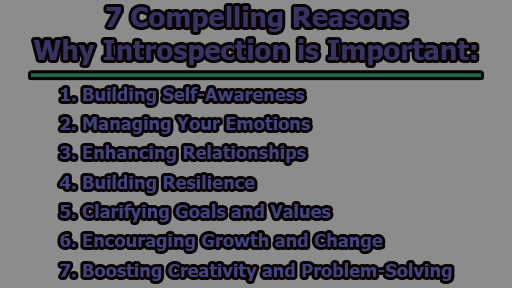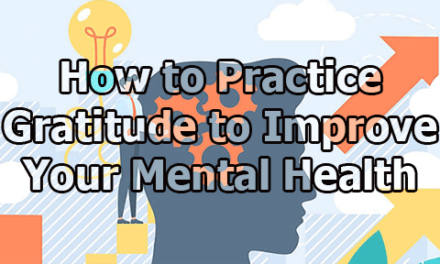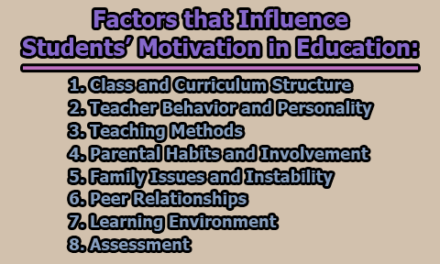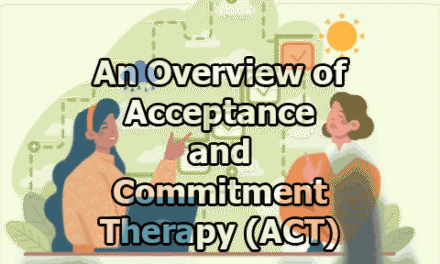7 Compelling Reasons Why Introspection is Important:
In today’s relentless and fast-paced world, filled with endless demands and distractions, taking a moment to pause and reflect can often seem like a rare indulgence. Yet introspection—the deliberate act of looking inward to examine our thoughts, emotions, and behaviors—is not just a luxury; it is a fundamental tool for cultivating a meaningful and fulfilling life. By fostering a profound understanding of ourselves, introspection equips us with the means to grow, build stronger relationships, and confidently face life’s challenges. In this article, we delve into seven compelling reasons why introspection is important, drawing on insights from contemporary studies and offering actionable strategies to incorporate this practice into your life.
What Is Introspection?
Introspection, derived from the Latin term introspectus (meaning “to look within”), is the conscious process of examining one’s internal mental and emotional landscape. It involves delving into your thoughts, emotions, and actions to understand the underlying motivations, triggers, and patterns that shape your behavior. More than a mere self-evaluation, introspection is a transformative practice that enables self-discovery and personal evolution.
Far from being an abstract or purely philosophical exercise, introspection is grounded in practical benefits. Through thoughtful self-reflection, individuals can gain clarity on their values, recognize their strengths, address their weaknesses, and align their actions with their long-term aspirations. It is a cornerstone of emotional intelligence, psychological resilience, and purposeful living—a perspective supported by a growing body of scientific research.
7 Compelling Reasons Why Introspection is Important:
Here are science-based reasons introspection is important, supported by research.
1. Building Self-Awareness: Self-awareness is the foundation of personal growth and effective decision-making. By engaging in introspection, you gain insight into your values, beliefs, and unique strengths, as well as areas where you may struggle. According to Carden et al. (2022), self-awareness empowers individuals to make decisions that align with their authentic selves and stay committed to their overarching goals.
How to Cultivate Self-Awareness:
- Journal regularly: Document your thoughts, feelings, and experiences to uncover patterns.
- Ask probing questions: Reflect on queries like, “What are my greatest strengths?” and “What challenges me the most?”
- Seek constructive feedback: Invite input from trusted friends or mentors who can provide fresh perspectives.
By sharpening your self-awareness, you unlock the ability to navigate life with intention and confidence.
2. Managing Your Emotions: Emotional regulation is a hallmark of maturity, and introspection plays a critical role in developing this skill. By reflecting on your emotional responses, you can identify triggers and learn healthier ways to cope with stressors. As London et al. (2023) highlight, taking responsibility for your emotions fosters a sense of control and composure.
Benefits of Emotional Regulation:
- Reduced overwhelm during high-pressure situations.
- Enhanced ability to resolve conflicts with patience and clarity.
- Improved relationships through honest and measured emotional expression.
Practical Strategies:
- Reflect on emotionally charged moments: Ask, “What caused me to feel this way?”
- Practice mindfulness techniques like deep breathing to manage intense emotions.
- Reframe negative thoughts into constructive insights, fostering resilience.
3. Enhancing Relationships: Healthy relationships thrive on understanding, empathy, and effective communication—qualities that introspection helps to cultivate. By analyzing your behavior and its impact on others, you can break unhealthy patterns, set clear boundaries, and nurture deeper connections. Morales (2024) emphasizes that introspection fosters conflict resolution and promotes mutual respect in relationships.
How Introspection Strengthens Relationships:
- Encourages accountability for actions that may harm others.
- Promotes the articulation of personal needs and expectations.
- Enhances empathy by fostering a better understanding of your own emotions.
Tips for Improving Relationships:
- After disagreements, reflect on your role and consider alternative responses.
- Identify what behaviors or attitudes you value in relationships and prioritize them.
- Express gratitude to strengthen emotional bonds with loved ones.
4. Building Resilience: Life is unpredictable, but introspection helps us adapt to challenges with grace and determination. By examining how you respond to adversity, you can identify solutions and develop coping mechanisms that strengthen your mental and emotional fortitude. As Carden et al. (2022) assert, early recognition of problems through self-reflection fosters resilience.
Benefits of Resilience Through Introspection:
- Greater ability to stay calm under duress.
- A mindset focused on learning and growth, rather than defeat.
- Increased confidence in handling future challenges.
Steps to Enhance Resilience:
- Reflect on past adversities and pinpoint strategies that helped you overcome them.
- Focus on leveraging your strengths to tackle current challenges.
- Reframe setbacks as opportunities for personal growth.
5. Clarifying Goals and Values: Introspection provides clarity about what truly matters, enabling you to align your actions with your core values and long-term aspirations. Without this alignment, it’s easy to feel unmoored or overwhelmed. London et al. (2023) highlight that clarity of purpose not only reduces stress but also facilitates deliberate and meaningful decision-making.
How Introspection Clarifies Direction:
- Helps you identify priorities that resonate with your values.
- Encourages the setting of purposeful, attainable goals.
- Prevents distractions from derailing progress toward meaningful achievements.
Practical Exercises:
- Create a personal values statement to guide your choices.
- Visualize your ideal future and chart actionable steps to achieve it.
- Periodically reassess your goals to ensure they remain aligned with your evolving priorities.
6. Encouraging Growth and Change: Change can be daunting, but introspection fosters the courage needed to step out of your comfort zone. By identifying areas where growth is possible, you can break free from stagnation and embrace opportunities for improvement. As Carden et al. (2022) note, self-reflection ignites motivation and paves the way for transformation.
How Introspection Fuels Growth:
- Helps uncover limiting beliefs or habits that hinder progress.
- Encourages openness to new experiences and challenges.
- Builds confidence by celebrating incremental progress.
Actionable Tips:
- Reflect on aspects of your life that feel unfulfilling and brainstorm actionable changes.
- Set small, specific goals to build momentum and track progress.
- Recognize and celebrate achievements, no matter how modest, to maintain motivation.
7. Boosting Creativity and Problem-Solving: Reflection often serves as the catalyst for innovation and fresh perspectives. By examining experiences and considering alternative viewpoints, introspection enhances both creativity and critical thinking. Ruini and Mortara (2022) found that practices such as journaling can help unlock new ideas and solutions to complex problems.
How Introspection Enhances Creativity:
- Provides clarity and insight into multifaceted challenges.
- Encourages exploration of unconventional or overlooked ideas.
- Builds confidence in experimenting with novel approaches.
Creative Practices:
- Use brainstorming tools like mind mapping to expand your thinking.
- Maintain a journal to capture and explore emerging ideas.
- Embrace moments of quiet reflection to allow your mind to wander and spark innovation.
Practical Guidelines for Healthy Introspection:
While introspection is an invaluable tool, excessive rumination can be counterproductive. To strike the right balance, consider these strategies:
- Dedicate quiet time: Schedule regular intervals for reflection, whether daily or weekly.
- Ask constructive questions: Frame your introspection around growth-focused queries, such as, “What can I learn from this experience?”
- Practice self-compassion: Avoid harsh self-criticism; focus instead on kindness and understanding.
- Leverage supportive tools: Guided journals, mindfulness apps, or reflective prompts can help structure your practice.
Finally, we can say that introspection is much more than an inward gaze; it is a powerful means of self-discovery, personal development, and emotional resilience. By engaging in deliberate self-reflection, you can cultivate self-awareness, navigate emotions, strengthen relationships, and pursue your aspirations with clarity and determination. Research underscores its profound impact on fostering creativity, adaptability, and fulfillment.
Making introspection a regular habit requires commitment, but the benefits are transformative. As you deepen your understanding of yourself, you embark on a journey toward a more authentic, purposeful, and enriched life. Why not begin today? The path to growth, resilience, and meaning starts with a single moment of reflection.
References:
- Carden, J., Jones, R. J., & Passmore, J. (2022). Defining self-awareness in the context of adult development: A systematic literature review. Journal of Management Education, 46(1), 140–177. https://doi.org/10.1177/1052562921990065
- London, M., Sessa, V. I., & Shelley, L. A. (2023). Developing self-awareness: Learning processes for self-and interpersonal growth. Annual Review of Organizational Psychology and Organizational Behavior, 10(1), 261–288. https://doi.org/10.1146/annurev-orgpsych-120920-044531
- Morales, J. (2024). Introspection is signal detection. The British Journal for the Philosophy of Science, 75(1), 99–126.
- Ruini, C., & Mortara, C. C. (2022). Writing technique across psychotherapies—from traditional expressive writing to new positive psychology interventions: A narrative review. Journal of Contemporary Psychotherapy, 52, 23–34. https://doi.org/10.1007/s10879-021-09520-9

Library Lecturer at Nurul Amin Degree College










